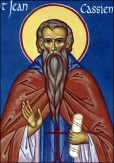Peter
Active Member
‘In theology, synergism is the position of those who hold that salvation involves some form of cooperation between divine grace and human freedom. It stands opposed to monergism, a doctrine most commonly associated with the Lutheran and Reformed Protestant traditions, whose soteriologies have been strongly influenced by the North African theologian Augustine of Hippo (354–430). Synergism is upheld by the Eastern Orthodox, Methodist, and Catholic Churches, and is an integral part of Arminian theology.
Synergism, the teaching that there is “a kind of interplay between human freedom and divine grace”, is an important part of the salvation theology of the Roman Catholic Church, and also of the Eastern Orthodox Church: “To describe the relation between the grace of God and human freedom, Orthodoxy uses the term cooperation or synergy (synergeia); in Paul’s words, ‘We are fellow-workers (synergoi) with God‘ (1 Corinthians iii, 9). If we are to achieve full fellowship with God, we cannot do so without God’s help, yetwe must also play our own part: we humans as well as God must make our contributionto the common work, although what God does is of immeasurably greater importance than what we do.”
These churches reject the notion of total depravity: they hold that, even after the Fall, man remains free, and human nature, though wounded in the natural powers proper to it, has not been totally corrupted. [Click here to read my attack on Western original sin.] In addition, they reject the idea that would “make everything the work of an all-powerful divine grace which arbitrarily selected some to be saved and some to be damned, so that we human beings had no freedom of choice about our eternal fate”. [Click here to read my attack on this doctine.]
They also teach that the ability of the human will to respond to divine grace is itself conferred by grace. “By the working of grace the Holy Spirit educates us in spiritual freedom in order to make us free collaborators in his work in the Church and in the world”. “The preparation of man for the reception of grace is already a work of grace.” “When Catholics say that persons ‘cooperate’ in preparing for and accepting justification by consenting to God’s justifying action, they see such personal consent as itself an effect of grace, not as an action arising from innate human abilities.” “When God touches man’s heart through the illumination of the Holy Spirit, man himself is not inactive while receiving that inspiration, since he could reject it; and yet, without God’s grace, he cannot by his own free will move himself toward justice in God’s sight.”
Arminian Protestants share this understanding of synergism, i.e., regeneration as the fruit of free will’s cooperation with grace.
This is similar to the position taken in the Conferences of St. John Cassian.
In this wor
 k, the matter of grace and faith is taken as analogous to that of the invalids that Christ healed. That Christ met the ill persons where they were is likened to prevenient grace because unless Christ went to them, the invalids would have had no opportunity to ask him for help. Likewise, without prevenient grace no sinner would be able to ask God for help. The actual asking for help comes from the free choice of the invalid or person in question. It is made possible by Christ’s presence (by prevenient grace), but there is no necessary outcome: Christ’s presence (prevenient grace) leaves a person able to ask for help, but also able to refuse to ask for help. Asking, however, does not accomplish anything to actually heal the person; Christ’s response to their request is what heals them, not their own choice. Likewise, God saves those who ask Him. However, they are only able to ask because He first comes to them with prevenient grace. Nonetheless, they are free to refuse to ask for His help, just as the invalids were free to not ask Christ for healing. Thus it is concluded, “it belongs to divine grace to give us opportunities of salvation… it is ours to follow up the blessings which God gives us with earnestness or indifference.” God is then free to decide how to response to our earnestness or indifference, which make up a part of the data which He considers in His free decision. We know, however, that in love He will respond by completing the salvation of those who respond earnestly, while leaving those who respond with indifference to their own devices.’ (1, added “[]”, emphasis added)
k, the matter of grace and faith is taken as analogous to that of the invalids that Christ healed. That Christ met the ill persons where they were is likened to prevenient grace because unless Christ went to them, the invalids would have had no opportunity to ask him for help. Likewise, without prevenient grace no sinner would be able to ask God for help. The actual asking for help comes from the free choice of the invalid or person in question. It is made possible by Christ’s presence (by prevenient grace), but there is no necessary outcome: Christ’s presence (prevenient grace) leaves a person able to ask for help, but also able to refuse to ask for help. Asking, however, does not accomplish anything to actually heal the person; Christ’s response to their request is what heals them, not their own choice. Likewise, God saves those who ask Him. However, they are only able to ask because He first comes to them with prevenient grace. Nonetheless, they are free to refuse to ask for His help, just as the invalids were free to not ask Christ for healing. Thus it is concluded, “it belongs to divine grace to give us opportunities of salvation… it is ours to follow up the blessings which God gives us with earnestness or indifference.” God is then free to decide how to response to our earnestness or indifference, which make up a part of the data which He considers in His free decision. We know, however, that in love He will respond by completing the salvation of those who respond earnestly, while leaving those who respond with indifference to their own devices.’ (1, added “[]”, emphasis added)

 crosstheology.wordpress.com
crosstheology.wordpress.com
Synergism, the teaching that there is “a kind of interplay between human freedom and divine grace”, is an important part of the salvation theology of the Roman Catholic Church, and also of the Eastern Orthodox Church: “To describe the relation between the grace of God and human freedom, Orthodoxy uses the term cooperation or synergy (synergeia); in Paul’s words, ‘We are fellow-workers (synergoi) with God‘ (1 Corinthians iii, 9). If we are to achieve full fellowship with God, we cannot do so without God’s help, yetwe must also play our own part: we humans as well as God must make our contributionto the common work, although what God does is of immeasurably greater importance than what we do.”
These churches reject the notion of total depravity: they hold that, even after the Fall, man remains free, and human nature, though wounded in the natural powers proper to it, has not been totally corrupted. [Click here to read my attack on Western original sin.] In addition, they reject the idea that would “make everything the work of an all-powerful divine grace which arbitrarily selected some to be saved and some to be damned, so that we human beings had no freedom of choice about our eternal fate”. [Click here to read my attack on this doctine.]
They also teach that the ability of the human will to respond to divine grace is itself conferred by grace. “By the working of grace the Holy Spirit educates us in spiritual freedom in order to make us free collaborators in his work in the Church and in the world”. “The preparation of man for the reception of grace is already a work of grace.” “When Catholics say that persons ‘cooperate’ in preparing for and accepting justification by consenting to God’s justifying action, they see such personal consent as itself an effect of grace, not as an action arising from innate human abilities.” “When God touches man’s heart through the illumination of the Holy Spirit, man himself is not inactive while receiving that inspiration, since he could reject it; and yet, without God’s grace, he cannot by his own free will move himself toward justice in God’s sight.”
Arminian Protestants share this understanding of synergism, i.e., regeneration as the fruit of free will’s cooperation with grace.
This is similar to the position taken in the Conferences of St. John Cassian.
In this wor


Synergism
Read also Living What We Believe “Enoch walked with God” – Genesis 5:22 [and 24] (KJV) “Noah walked with God” – Genesis 6:9 (KJV) ‘In theology, synergism i…
